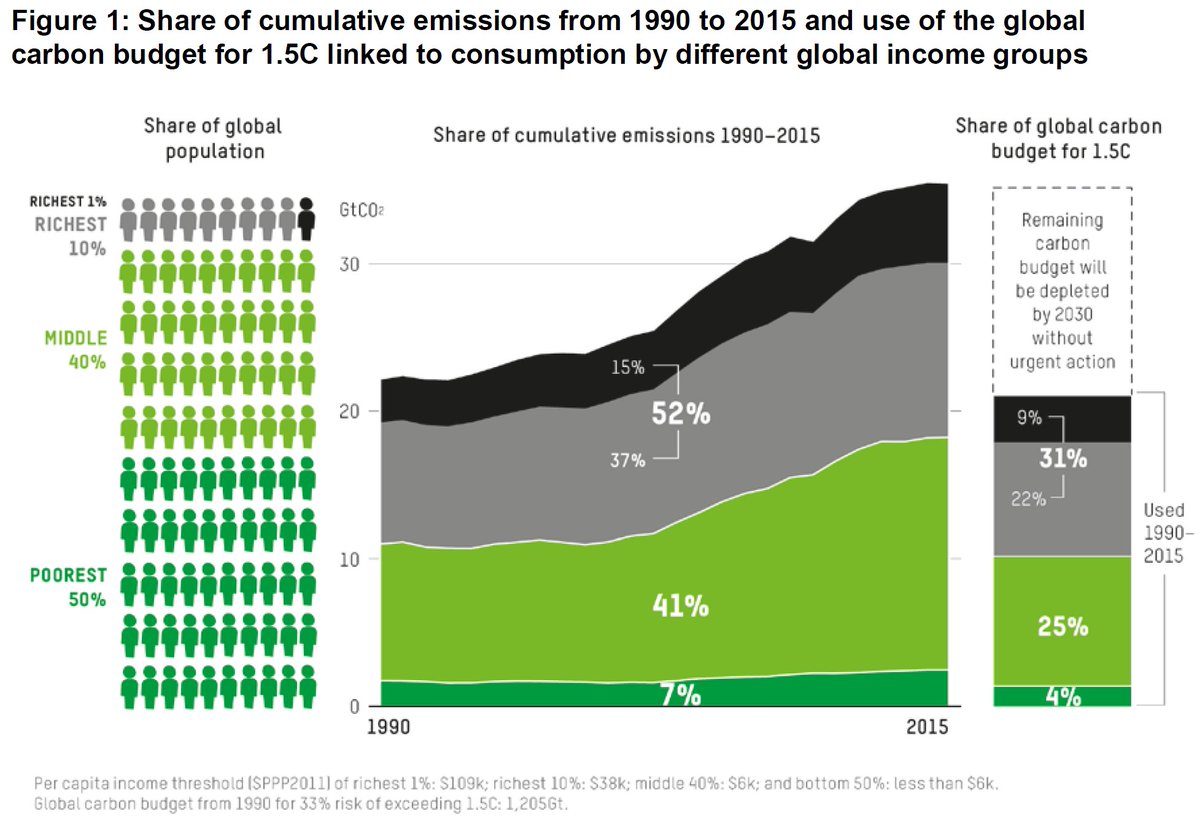Biodiversity & Environment
More Contribution to Emissions by Rich
- 03 Oct 2020
- 6 min read
Why in News
Recently, the Oxfam International and the Stockholm Environmental Institute (SEI) has released a report titled “Confronting Carbon Inequality”, which highlights that a rich person contributes more to the climate crisis than a poor person.
- Oxfam is a global organisation with affiliates in 20 countries, working together to end the injustice of poverty.
- SEI is an international non-profit research and policy organisation which promotes sustainability in policy making.
Key Points
- Data Analysis from 1990 to 2015:
- Cumulative Emissions: The richest 1% of humanity accounted for 15% of cumulative emissions, while the poorest 50% accounted for only 7%.
- Depletion of Global Carbon Budget: The richest 10% depleted the global carbon budget by 31% and the poorest 50% used only 4% of the carbon budget.
- A carbon budget is a cumulative amount of carbon dioxide (CO2) emissions permitted over a period of time to keep within a certain temperature threshold.
- Emissions Growth: While the richest 10% accounted for 46% of emissions growth, the poorest 50% accounted for only 6%.
- About half of the emissions of the richest 10% are associated with North America and the European Union (EU).
- Indian Comparison with Others:
- An Indian emitted only 1.97 tonnes of CO2 (tCO2) annually, while Americans and Canadians both emitted well over 16 tCO2.
- The per capita CO2 emissions of the richest 10% of Indians were about 4.4 tonnes in 2018, in comparison to the per capita emissions of the richest 10% Americans were 52.4 tonnes, almost 12 times that of the richest Indians.
- India’s per capita emissions were a fraction of not just the EU (6.78 tCO2/person), but also China (7.95 tCO2/person), making it the lowest per capita emitter amongst the world’s large economies.
- Highlighted Concerns:
- The global carbon budget is being rapidly depleted due to the increasing consumption of the rich in the name of dignity and a decent standard of living.
- Of this increased consumption, the largest share of emissions by the rich was from flights and cars, including private jets, luxury SUVs and sports cars.
- Also, the report briefly acknowledged the intersectionality of income inequality and the climate crisis with factors such as race, class, gender, caste and age.
- For example, gender pay inequity meant that men earned higher wages than women which led to higher spendings and more travels.
- Global consumption and production models are driven by tenets of capitalistic growth and neoliberalism and it is impossible to decouple those systems from resource extraction and environmental degradation.
- Moderate measures such as carbon tax and non-binding climate commitments from corporations and countries are inadequate while considering the scale of transformation.
- The global carbon budget is being rapidly depleted due to the increasing consumption of the rich in the name of dignity and a decent standard of living.
- Suggestions:
- Systemic change rather than a sole focus on individual action.
- Clip emissions of the richest 10% and reduce the per capita footprint to the 1.5°C-consistent level by 2030 which would cut annual carbon emissions by over a third.
- Call for “new economic models that do not depend on the endless growth in consumption of the already affluent”.
- This is a departure from the mainstream discourse on climate solutions which tends to focus on changes in behaviour and personal habits such as driving electric vehicles and consuming less meat.
- Comprehensive approaches like the Green New Deal (popular in the USA in 2018 and different from the European Green Deal), which might help avert the worst of the climate crisis amid widespread income inequality and imbalanced power structures.
- The Green New Deal combines a series of goals including 100% renewable energy, along with full access to health care and guaranteed wages.
- The United Nations Conference on Trade and Development (UNCTAD) echoed the same in 2019 and called for a global iteration of a Green New Deal through a large-scale investment push led by the public sector instead of the private sector.
- Wealth redistribution via taxes on the wealthiest, rapid decarbonisation via large-scale public investments in clean energy and low carbon transportation, mass mobilization and the creation of a social safety net through measures like jobs guarantee programme and universal healthcare.
Way Forward
- The findings of study highlights the importance of the concept of Common But Differentiated Responsibilities (CBDR) which establishes that all states are responsible for addressing global environmental destruction yet not equally responsible.
- The general principles of equity in international law must be adhered to. The historical correlation between higher levels of development and a greater contribution to the degradation of global environmental resources, such as water and air, must be recognised.
- Therefore, the developed countries, which had been able to develop for longer times unimpeded by environmental restrictions, now need to take a greater share of responsibility.







